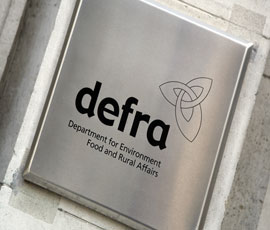Summit told farm profits pared to the bone

Rising costs and unfair prices have cut farm profits to the bone, leaving businesses unable to cope with volatile markets and times of crisis, a farm summit has been told.
DEFRA secretary Owen Paterson called the major banks, rural charities and farm industry leaders to the summit at DEFRA’s headquarters in London on 8 May.
Mr Paterson said he wanted to improve farmers’ access to financial support that is already available and to find new ways to help improve their businesses’ resilience to crises such as the extreme weather of the past 12 months.
Representatives from HSBC, Lloyds, the Royal Bank of Scotland, Barclays, the NFU, The Prince of Wales’ Countryside Fund, The Addington Fund and Tenant Farmers Association (TFA) were among those attending the meeting.
But TFA chief executive George Dunn told Farmers Weekly ahead of the meeting that the government and others “couldn’t point the finger at farmers for being unprepared for the past year’s weather and volatile prices”.
“The weather has just exposed the long-term lack of profitability in farming. For years, farmers have been pushed to be more and more efficient, cutting costs wherever possible and selling as competitively as possible. Margins are no longer there to cope with stresses like fodder shortages and price hikes in fuel and fertiliser.
“Farmgate prices must improve and for that to happen the supply chain should share profits more fairly under the watch of the groceries code adjudicator Christine Tacon.”
Mr Dunn said he would also press the importance of maintaining direct support payments through a strong Pillar 1.
“The government has argued to divert more CAP funding into Pillar 2 but this will leave businesses more vulnerable. Direct support helps to smooth out the financial ups and downs in a volatile market. Pillar 1 payments are justifiable on this basis alone,” he said.
“The past year has also taught us to strive for more realistic rent prices,” he added. “It’s a lesson for all of us – tenants and farmers alike. Tenders of £250/acre are unrealistic. Costs like these have pared profit to the bone and left businesses vulnerable to any challenge.”
NFU chief economist Phil Bicknell echoed the TFA’s points and added that borrowing levels in farming were rising dramatically.
“Bank lending to farmers is up by 10.5% in the past 12 months to £13.75bn. While we welcome the fact that the banks have continued to support businesses in this way it does show how dependent on credit the industry has become.
“The concern is that the increased borrowing is not being used for investment but is just being used to keep businesses going, with fodder prices alone increasing by 20%.
“We need a long-term shift. The government needs to inject more confidence and that means encouraging more fairness in the market, shorter supply chains and legislation to improve investments.
“We need to know they are working with us and we are hoping the summit will be a useful step towards this,” he said.
DEFRA hosts summit to help cash-strapped farmers
